Bombay High Court upholds validity of the RERA Act
December 07, 2017
The Bombay High Court, on Wednesday, upheld the constitutional validity of Real Estate (Regulation and Development) Act, 2016. The Act seeks to protect the home buyers by providing them the right to claim compensation from the builders for the delay in possession of flats. The Act also provides for a system of mandatory registration of the promoters and builders under the state level regulatory authority.
Latest Legal News
.jpg)
3 Bills to Renew India's Criminal Justice System presented in Lok Sabha; All you Need to Know

âSorry state of affairs' in PoSH Act implementation; SC orders Govts. to ensure ICCs are constituted


 642+ Lawyers are online
642+ Lawyers are online 


.jpg)


